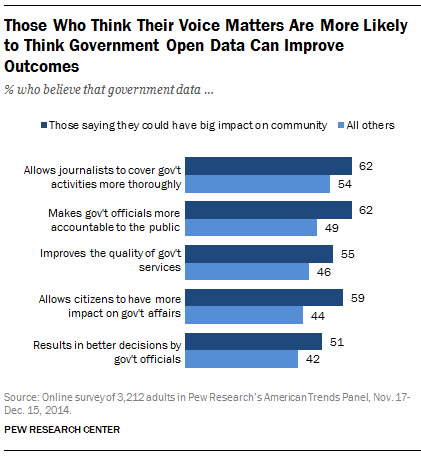People’s views about the possible impact of government data initiatives sort roughly into two categories along the lines of government accountability and government performance. Americans are generally optimistic that open data can improve accountability — directly by encouraging government officials to be more accountable to the public or indirectly by helping journalists do their jobs better. When it comes to metrics of government performance (i.e., whether open data will improve the quality of services), people’s views are decidedly mixed.
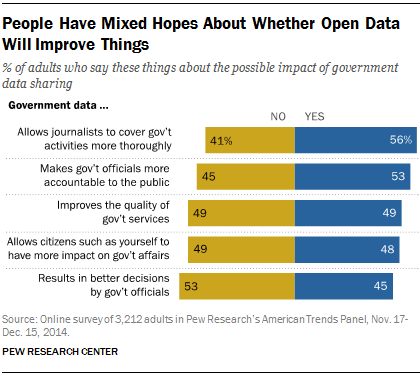
Focusing on accountability, 56% say government data initiatives can help journalists cover government better and 53% say these initiatives could make government officials more accountable. This comes to two-thirds (66%) of adults saying open data would accomplish at least one of the two goals, with 34% not accepting these notions.
For measures about government performance, half of adult Americans say government open data efforts could improve the quality of government services and 45% say open data could results in better decisions by government officials. Just under half (48%) think government data means they are likely to have more of an impact on government affairs.
Younger and better educated adults are more likely to be optimistic about the possibilities of government data than others. The table below shows that those with college degrees exceed the survey average by as many as a dozen percentage points; millennials are also more likely than others, by steady margins, to be optimistic about data’s impact on government.
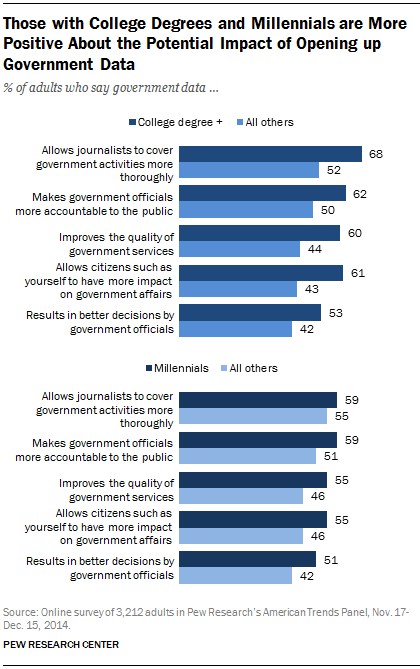
People’s attitudes toward trusting government help shape their views about whether data initiatives will bring benefits
Beneath these results showing optimism about government data’s impacts are people’s baseline attitudes about government. And indeed how people view the possible benefits of data initiatives varies with how they view two things: 1) Their trust in government and 2) Whether they believe they can have an impact on their community.
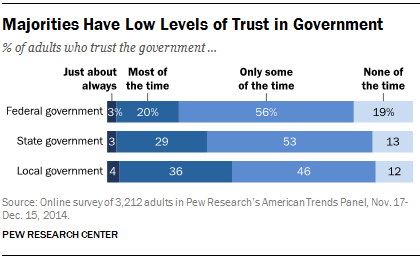
Only a minority of Americans believe any level of government can be trusted most or just about all the time, though four-in-ten Americans believe this about local government.
Younger Americans are somewhat more likely to trust the federal government most of the time (28% of adults under the age of 30 do), as well as Hispanics and African Americans (33% and 29%, respectively, trust the federal government to do the right thing).
Those who say they trust the government at least most of the time are more likely than those who do not to say open data initiatives could have positive impacts. Those who are likely to trust the federal government most or about all the time are very likely to see positive impacts from government data initiatives.
The differences in attitudes of possible impacts are more striking when comparing responses of those who trust the federal government most of the time to those who do not. The following table shows the wide gaps — at least 20 percentage points and in one case more than 30.
The findings suggest that people’s trust in government — the federal government in particular — has a lot to do with how they view the potential benefits of government data initiatives. The issue for those with high hopes for data initiatives and civic engagement is that relatively few (23%) Americans trust the federal government to do the right thing either always or most of the time.
Trust, political leanings, and behavior: Democrats are more likely to trust government and be optimistic about data’s impacts, but party identification has little impact on using the online government data applications
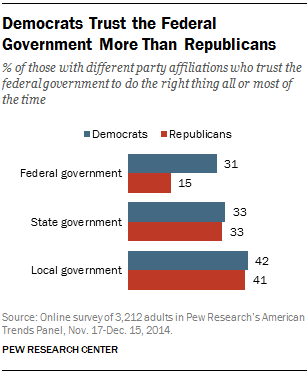
With trust in government strongly shaping people’s attitudes about the potential benefits of government data initiatives, and party identification likely to have something to do with people’s trust in government, it makes sense to explore the role of respondents’ political leanings. In this survey, 48% of respondents say they are either Democrats (or lean that way) and 41% identify as Republicans (or lean that way), with the remainder saying they are independent. Democrats are about twice as likely as Republicans to say that the federal government can be trusted to do the right thing most of the time (31% vs. 15%). The table to the right shows how trust plays out for each of the three levels of government when comparing political affiliation — with the differences in trust of the federal government being the obvious difference between Republicans and Democrats. Note that past Pew Research Center surveys find that trust in government among Republicans and Democrats varies depending on which party holds the presidency. When a Republican holds the presidency, Republicans’ level of trust in the federal government is high, while Democrats’ trust in the federal government exceeds that of Republicans when a Democrat is president.
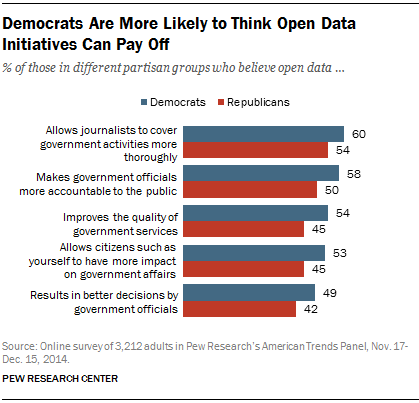
Turning to attitudes about the impact of government data, Democrats are generally more likely to see potential benefits in government data initiatives than Republicans. The gaps are in the 6 to 9 point range across all questions, which is narrower than the margins between Democrats and Republicans for trust in the federal government.
It is also worth looking at differences between Republicans and Democrats on behavior — that is, their use of online tools for interacting with government. The table below compares the collected incidence of several kinds of activities: use of the internet or an app to find out about any of the three levels of government, whether people had done any of six things online (such as renewing a drivers’ license or paying a toll), or whether they had monitored certain aspects of government performance online (e.g., teacher performance, hospital or health care provider performance, or looking at crime reports).
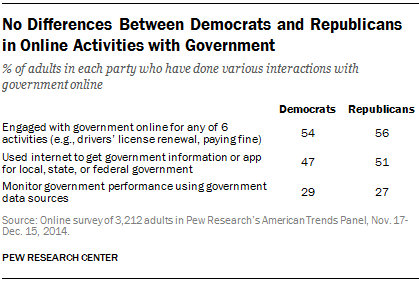
As the table to the right shows, there are small — and not statistically significant — differences between Democrats and Republicans when the focus is on behavior. Being a Republican or a Democrat has nothing to do with whether a person uses online tools and government data sources to find out about something or carry out a transaction with government.
The analysis shows that party identification influences Americans’ trust in government, which in turn shapes people’s views on whether government data initiatives will bear fruit in terms of government performance and accountability. Yet party identification has very little to do with people’s choices on whether to use government data or the internet to engage with government.
Those who think their voices count are more likely to think that government data initiatives can improve government and civic life
Similar, though less pronounced, patterns are evident when people were asked whether they felt they could have an impact on making their community a better place to live. Among all American adults:
- 32% say they could have a big impact
- 37% say they could have a moderate impact
- 23% say they could have a small impact
- 7% say they could have no impact at all
Here’s how those who say they could have a big impact responded to questions about government data initiatives compared with everyone else.
